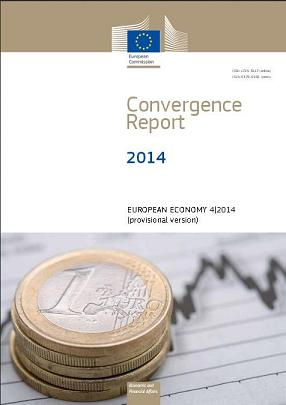Rogoff, K. (2014) “The 4% Non-Solution”, Project Syndicate, 05 Ιουνίου. PARIS – For some time now, there has been concern that central bankers have “run out of bullets.” Having lowered their policy rates to near zero, they have engaged in increasingly extravagant measures such as “quantitative easing” and “forward guidance.” Given the fog cast over real economic activity by the financial crisis, it is difficult to offer a definitive …Read More
Creating an Innovation Society
Stiglitz, J. (2014) “Creating an Innovation Society“, Social Europe Journal, 04 Ιουνίου. Citizens in the world’s richest countries have come to think of their economies as being based on innovation. But innovation has been part of the developed world’s economy for more than two centuries. Indeed, for thousands of years, until the Industrial Revolution, incomes stagnated. Then per capita income soared, increasing year after year, interrupted only by the occasional effects of …Read More
Convergence Report, European Economy 4/2014
European Commission (2014) “Convergence Report, European Economy 4/2014”, Economic and Financial Affairs, Ιούνιος: Βρυξέλλες. Convergence Reports examine whether Member States satisfy the conditions for adopting the single currency. Convergence reports are issued by the European Commission and the European Central Bank every two years, or more often if a country intending to join the euro requests it. These reports form the basis for the decision on whether a Member …Read More
“Spain is Different”: Podemos and 15-M”
Flesher Fominaya, C. (2014) ““Spain is Different”: Podemos and 15-M“, LSE EUROPP, 04 Ιουνίου. In a dismal post-European election scenario, in which the extreme right has managed to emerge as the leading political formation in a number of European democracies, Spain has once again lived up to the 1960’s tourist slogan “Spain is different”. While the right-wing party Partido Popular (PP) won the most votes, the real news is …Read More
Failing Union Of Capitalism And Democracy Fuels Rise In Inequality
Merkel, W. (2014) “Failing Union Of Capitalism And Democracy Fuels Rise In Inequality“, Social Europe Journal, 03 Ιουνίου. Recent weeks have been all about elections and broken promises: from early April to mid-May, half-a-billion Indians went to the polls in what many described an astonishing display of democratic prowess. Later, millions of European citizens elected their representatives to the often-criticised and never much-loved European Union parliament. Meanwhile, Australian prime …Read More
The euro’s effect on trade
Sadeh, T. (2014) “The euro’s effect on trade“, European Union Politics, Vol. 15, No. 2, Ιούνιος. This study argues that the euro area more than doubled trade among its members, but this process was delayed and fitful. The estimates in this article are close to those obtained by Rose and Frankel, despite the usage of methods developed by their critics. Furthermore, the euro area has increased the trade of …Read More
Common Misconceptions about the European Parliamentary Elections
Gros, D., Piedrafita, S., (2014), “Common Misconceptions about the European Parliamentary Elections”, CEPR Commentary, Μάιος. Much commentary on the EP elections has followed the line that the European Parliament somehow has less democratic legitimacy because the participation rate is low, and that these elections are taken less seriously because people’s trust in the EU institutions in general and the European Parliament in particular is low. Both arguments lose much of …Read More
Lacklustre investment in the Eurozone: Is there a puzzle?
Buti, M., Mohl, Ph., (2014), “Lacklustre investment in the Eurozone: Is there a puzzle?”, www.voxeu.org, 4 Ιουνίου. Investment in the Eurozone is forecast to remain below trend until 2015, with a particularly large shortfall in the periphery. Low investment reduces aggregate demand, thus lowering short-term growth, and it also hampers medium-term growth through its effect on the capital stock. This article highlights three causes of low Eurozone investment – reduced …Read More
A Manifesto for European Change
Blair, T. (2014) “A Manifesto for European Change“, Project Syndicate, 03 Ιουνίου. LONDON – Interpreting election results, especially when turnout is not high, is always a risky business. And, in the case of the recent European Parliament election, the results were not uniform. The most spectacular result was in Italy, where a pro-reform, pro-Europe party led by Prime Minister Matteo Renzi won more than 40% of the vote. Chancellor …Read More
Voting With Their Feet’, Highly Skilled Emigrants From Southern Europe
Gropas, R. & Triandafyllidou, Α. (2014) “’Voting With Their Feet’, Highly Skilled Emigrants From Southern Europe”, American Behavioral Science (ABS), Ιούνιος. In this article, the authors present new empirical data on highly skilled emigrants from two southern European countries, Italy and Greece, which have been particularly hit by the global financial and Eurozone crisis. The data have been generated by an e-survey conducted in late spring and summer 2013. …Read More





